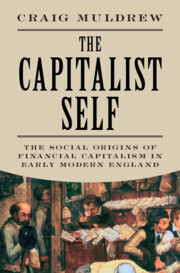Refine search
Actions for selected content:
483 results
5 - Capitalism
-
-
- Book:
- Explaining the History of American Foreign Relations
- Published online:
- 24 October 2025
- Print publication:
- 13 November 2025, pp 103-120
-
- Chapter
- Export citation
1 - Early Modern Capitalism: A Concept Too Big to Fail?
-
- Book:
- The Capitalist Self
- Published online:
- 12 October 2025
- Print publication:
- 30 October 2025, pp 15-56
-
- Chapter
- Export citation
African Entrepreneurs as Agents of Capitalism - Capitalism in the Colonies: African Merchants in Lagos, 1851–1931 A. G. Hopkins. Princeton, NJ: Princeton University Press, 2024. Pp. 562. $49.95, hardcover (ISBN: 9780691258843).
-
- Journal:
- The Journal of African History / Volume 66 / 2025
- Published online by Cambridge University Press:
- 28 October 2025, e23
-
- Article
- Export citation
Sustainable Disaster: Fantasies of Resilience, Global Adaptation Science, and East Asia’s Seawomen
-
- Journal:
- Comparative Studies in Society and History , First View
- Published online by Cambridge University Press:
- 17 October 2025, pp. 1-27
-
- Article
-
- You have access
- Open access
- HTML
- Export citation
Introduction
-
- Book:
- Hegel Beyond Liberalism
- Published online:
- 27 September 2025
- Print publication:
- 16 October 2025, pp 1-10
-
- Chapter
- Export citation
Conclusion: Beyond Hegel
-
- Book:
- Hegel Beyond Liberalism
- Published online:
- 27 September 2025
- Print publication:
- 16 October 2025, pp 207-213
-
- Chapter
- Export citation
Chapter 5 - The Dialectic of Economic Freedom
- from Part II - Hegel Beyond Liberalism
-
- Book:
- Hegel Beyond Liberalism
- Published online:
- 27 September 2025
- Print publication:
- 16 October 2025, pp 130-188
-
- Chapter
- Export citation

The Capitalist Self
- The Social Origins of Financial Capitalism in Early Modern England
-
- Published online:
- 12 October 2025
- Print publication:
- 30 October 2025
12 - Capitalism and Class
- from Part III - Merchants in the Round
-
- Book:
- Making Merchants
- Published online:
- 19 September 2025
- Print publication:
- 09 October 2025, pp 186-209
-
- Chapter
- Export citation
Notebook
-
- Book:
- The Epistemology of the Secret
- Published online:
- 23 July 2025
- Print publication:
- 09 October 2025, pp 145-154
-
- Chapter
- Export citation
12 - Conclusions
- from Part V - Global Deforestation
-
- Book:
- Clearcut
- Published online:
- 03 October 2025
- Print publication:
- 02 October 2025, pp 256-265
-
- Chapter
-
- You have access
- Open access
- HTML
- Export citation
1 - Theorizing Regionally Dominant Political and Moral Economies as Causes of Deforestation
- from Part I - Introduction
-
- Book:
- Clearcut
- Published online:
- 03 October 2025
- Print publication:
- 02 October 2025, pp 3-30
-
- Chapter
-
- You have access
- Open access
- HTML
- Export citation
A Menace to Free Labor: Anti-Catholicism, the American Protective Association, and Working-Class Formation in Gilded Age America
-
- Journal:
- The Journal of the Gilded Age and Progressive Era / Volume 24 / Issue 4 / October 2025
- Published online by Cambridge University Press:
- 27 October 2025, pp. 409-430
- Print publication:
- October 2025
-
- Article
- Export citation
Supportive, Destructive, or Indifferent? Expanding Global Markets and the End of Slavery in Continental East Africa in the Twentieth Century
-
- Journal:
- Itinerario , First View
- Published online by Cambridge University Press:
- 29 September 2025, pp. 1-17
-
- Article
-
- You have access
- Open access
- HTML
- Export citation

Hegel Beyond Liberalism
- The Dialectic of Political and Economic Democracy
-
- Published online:
- 27 September 2025
- Print publication:
- 16 October 2025
Introduction: Hidden economies of slavery
-
- Journal:
- Itinerario , First View
- Published online by Cambridge University Press:
- 24 September 2025, pp. 1-10
-
- Article
-
- You have access
- Open access
- HTML
- Export citation
Conclusion
-
- Book:
- Maritime Relations
- Published online:
- 23 August 2025
- Print publication:
- 04 September 2025, pp 182-186
-
- Chapter
- Export citation
Chapter 1 - The Politics of Postmodern British Fiction
-
-
- Book:
- The Cambridge Companion to British Postmodern Fiction
- Published online:
- 07 August 2025
- Print publication:
- 21 August 2025, pp 18-32
-
- Chapter
- Export citation
Capitalism, imperialism and European Union Law: towards a Marxist approach
-
- Journal:
- European Law Open / Volume 4 / Issue 2 / June 2025
- Published online by Cambridge University Press:
- 20 August 2025, pp. 290-327
-
- Article
-
- You have access
- Open access
- HTML
- Export citation
Racialized Guatemalan Migrant Labor and Grassroots Civil Societies in the Greater Los Angeles Region
-
- Journal:
- Journal of Race, Ethnicity and Politics , First View
- Published online by Cambridge University Press:
- 15 August 2025, pp. 1-26
-
- Article
-
- You have access
- Open access
- HTML
- Export citation
